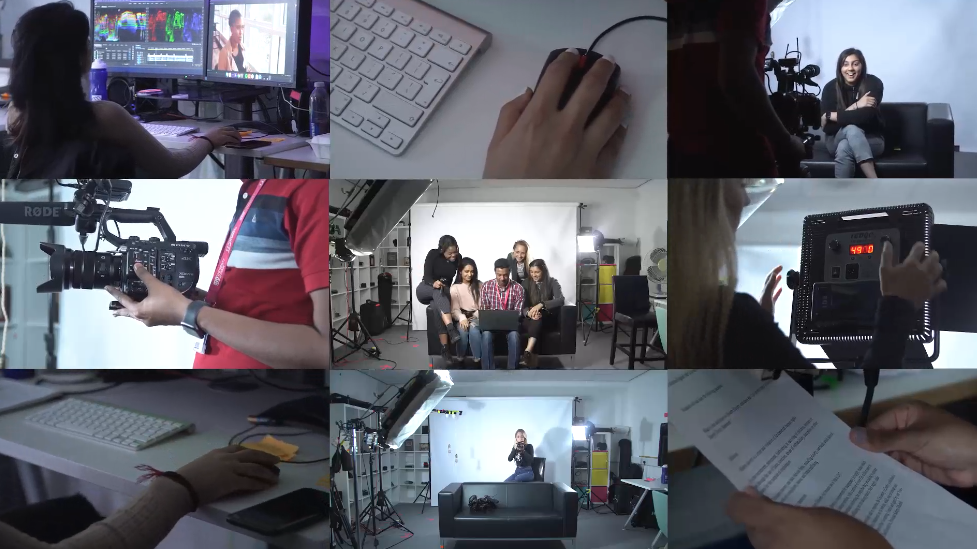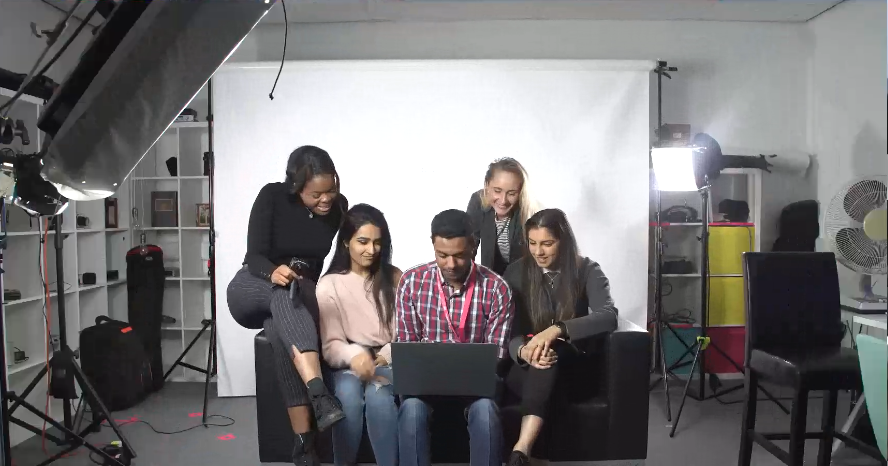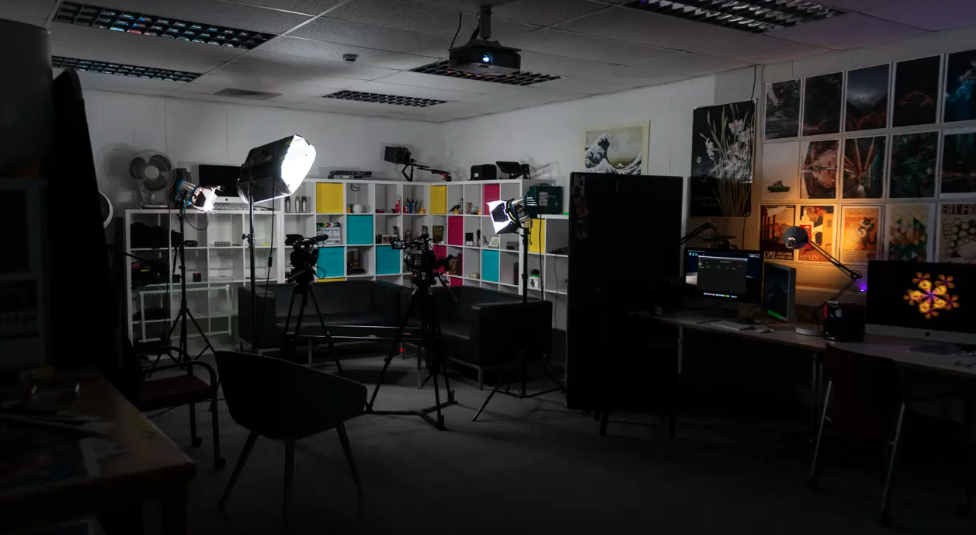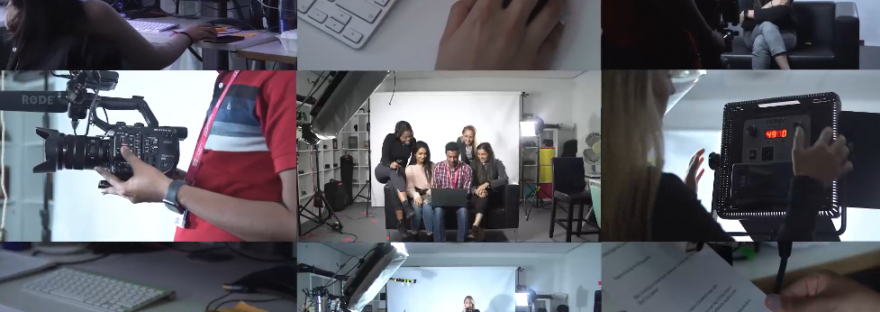At the University of Derby, the Technology Enhanced Learning (TEL) media team have been creating video content alongside academics to add and enhance their teaching materials as well as their students’ overall experiences. Adding video content into teaching increases student engagement, explains key concepts, and provides unique opportunities to bring real-world case studies and the ideas of industry experts into the classroom, when it is not possible elsewhere.
The need for this kind of content was growing more and more and we needed something to be able to scale to the whole of the university and offer this opportunity to all programmes. This is where we thought about using our own students to give them an authentic working experience and begin to build up a partnership with academics.

By creating these staff-student partnerships the process can aid all parties involved. A partnership is a process where both parties are engaged and encouraged to learn, creating an active learning environment. It can not only help to increase the students employability skills for their future, but also support staff along the way to learn new skills and create content they wouldn’t have had time or the skills to develop by themselves, therefore learning from each other. Providing the students with opportunities to learn new skills and gain a variety of experiences and transferable skills which are valuable to their futures, increasing their ability to develop a flexible career path which can adapt to change.
The University of Derby’s TEL team therefore created a role for several students at Easter 2019, which we called Digital Media Producers (DMPs). The role was advertised to all students across the university, with the majority who applied, and are now employed, being either Media Production or Business students. This was expected due to the nature of the role description, but also the experiences they require to advance themselves for their employment can be difficult to come by. However, this role can provide it to them within their institution, by allowing them to get the ‘real-world’ authentic learning they will require for their future employability. Within this role we see graduates gaining a wider range of transferable skills, that employers are also seeking, easing that transition from education to employment and therefore decreasing the skills gap. Some of the main transferable skills our DMPs have gained are the professional communication when working alongside different people within the university, being able to problem-solve when things have not gone as planned and the ability to work within a team.

We currently employ 7 DMPs on a part-time basis of 10-15 hours per week, which works around their course timetable. Individually they have determined how long each day they work for, so some work for full days, while other split it into shorter half-day shifts. We have been flexible with this and so far this has worked well. In return of this the students themselves have been flexible and if needed have worked flexibly for filming purposes.
The academic contacts a member in the TEL team, usually myself, who gets a brief for the teaching and learning content required, this is then passed onto one of the student DMPs who is introduced to the academic, usually with an initial face-to-face meeting with myself, but then work directly with the academic to bring the brief to life. The student can call upon the TEL team throughout the process to guide them through any technical issues or questions. TEL then review the project with the student before it goes back to the academic staff for any changes and final sign off. This process has created both responsibility and ownership for the DMPs in creating the content, which gives a fully co-production that they have worked on together.
We created a space for the student to work, which was a studio space we used already within the media team. We kitted it out with computers for pre-production and editing purposes, alongside a studio space for filming content as well as for them practicing the practical skills required. An online space was also created for the TEL team to communicate with the students, as well as allowing the students to create a community of practice together. This online community is served through Microsoft Teams where all manner of communication and sharing ideas can take place. This has proven to be vital during this lockdown period and is making it easy to talk to them via the calling options, either individually or in a group. The files area within their Teams channel comes in use for general content, self-development opportunities for the students and training material, such as ‘how to write a professional email’. This was something we soon realised they had not necessarily done before and we have seen how this has helped with their communication with the academic staff, especially from their feedback to the project. Academics have commented things such as “it was like working with a colleague” and “they were very professional”.

Finally, there is also a workplace planning area we have created which is linked to Teams through Trello, so all students and TEL members can keep on top of what projects need completing and where they are currently. So these online organisational programmes have extremely assisted both the students and TEL to know who is working on what, where they are in this process and communicate any other information.
Finally, the media team within TEL support the students greatly with training throughout their employment. Therefore, providing a ‘giving back’ style of working where the students are also increasing their knowledge all round to ‘top-up’ their learning gained from within their programme, increasing their skillset for their future employment. For example, they have learnt about the industry standard cameras and editing software, lighting techniques and location filming.
Some lessons we have learnt along the way:
- Keep talking to the DMPs – keeping them in the loop and being honest with them, this ensures they are keeping on track and fully understand what is being asked of them.
- Ensure the academics understand the limits – our DMPs would email the academics at the beginning of the partnerships to let them know when they worked so the academics knew what to expect.
- Providing the DMPs with training and practice time on the kit to ensure they are confident with using it.
- Having a shared communications area – this is great for quickly chatting to them, to each other and sharing data across the team easily.
Overall, it has been an extremely successful venture for all included, even with working with the challenges that Covid-19 has brought. All our Digital Media Producers have continued to work remotely with us both in the UK and Europe, creating computer instructional videos, infographics, and support for academics.
The feedback from academic staff and students has been positive. Considering that both parties have other priorities, the partnership of creating videos helped all to understand what was possible. But providing the students the support they needed from TEL was extremely important for the students to feel like they had someone there to ask any questions they were unsure of. The academics were impressed with how professional the students were and saw them as a colleague rather than a student. And the students enjoyed the variety of projects they worked on.
I am currently in my final year of my part-time Master of Education where I have concentrated, throughout, on digital elements within teaching and learning within Higher Education. I have just completed focus groups with the DMPs and the academic staff to gather their opinions on the workflow and process, with an analysis of this happening over the next few months. These findings will be able to inform our decisions for the future of the role.
Useful links:
Written by Charlotte Ellis
Charlotte Ellis is a Learning Technology Media Adviser at the University of Derby.
